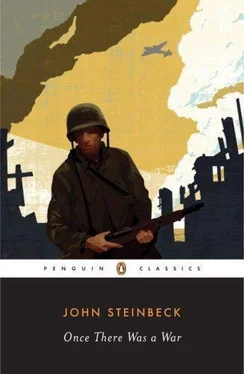John Steinbeck - Once there was a war
Здесь есть возможность читать онлайн «John Steinbeck - Once there was a war» весь текст электронной книги совершенно бесплатно (целиком полную версию без сокращений). В некоторых случаях можно слушать аудио, скачать через торрент в формате fb2 и присутствует краткое содержание. Город: New York, Год выпуска: 1960, Издательство: Bantam Books, Жанр: Классическая проза, на английском языке. Описание произведения, (предисловие) а так же отзывы посетителей доступны на портале библиотеки ЛибКат.
- Название:Once there was a war
- Автор:
- Издательство:Bantam Books
- Жанр:
- Год:1960
- Город:New York
- ISBN:нет данных
- Рейтинг книги:3 / 5. Голосов: 1
-
Избранное:Добавить в избранное
- Отзывы:
-
Ваша оценка:
- 60
- 1
- 2
- 3
- 4
- 5
Once there was a war: краткое содержание, описание и аннотация
Предлагаем к чтению аннотацию, описание, краткое содержание или предисловие (зависит от того, что написал сам автор книги «Once there was a war»). Если вы не нашли необходимую информацию о книге — напишите в комментариях, мы постараемся отыскать её.
Once there was a war — читать онлайн бесплатно полную книгу (весь текст) целиком
Ниже представлен текст книги, разбитый по страницам. Система сохранения места последней прочитанной страницы, позволяет с удобством читать онлайн бесплатно книгу «Once there was a war», без необходимости каждый раз заново искать на чём Вы остановились. Поставьте закладку, и сможете в любой момент перейти на страницу, на которой закончили чтение.
Интервал:
Закладка:
Once there was a war
by
John Steinbeck
The way it was
“THE LIEUTENANT WALKED SLOWLY
up the hill toward the German positions.
He carried his white flag over his head,
and his white flag was a bath towel.
Last night when he had argued for the
privilege of going up and trying to kid
the Jerry into surrender he hadn’t known it
would be like this. He hadn’t known
how lonely and exposed he would be.
The lieutenant knew that if he were hit and
not killed he would hear the shot after
he was hit, but if he were hit in the
head he wouldn’t hear or feel
anything. He hoped, if it happened, it
would happen that way…”
One of the Unforgettable Stories John Steinbeck Tells in Once There Was a WarOnce there was a war: an introduction
ONCE UPON A TIME there was a war, but so long ago and so shouldered out of the way by other wars and other kinds of wars that even people who were there are apt to forget. This war that I speak of came after the plate armor and longbows of Crécy and Agincourt and just before the little spitting experimental atom bombs of Hiroshima and Nagasaki.
I attended a part of that war, you might say visited it, since I went in the costume of a war correspondent and certainly did not fight, and it is interesting to me that I do not remember very much about it. Reading these old reports sent in with excitement at the time brings back images and emotions completely lost.
Perhaps it is right or even necessary to forget accidents, and wars are surely accidents to which our species seems prone. If we could learn from our accidents it might be well to keep the memories alive, but we do not learn. In ancient Greece it was said that there had to be a war at least every twenty years because every generation of men had to know what it was like. With us, we must forget, or we could never indulge in the murderous nonsense again.
The war I speak of, however, may be memorable because it was the last of its kind. Our Civil War has been called the last of the “gentlemen’s wars,” and the so-called Second World War was surely the last of the long global wars. The next war, if we are so stupid as to let it happen, will be the last of any kind. There will be no one left to remember anything. And if that is how stupid we are, we do not, in a biologic sense, deserve survival. Many other species have disappeared from the earth through errors in mutational judgment. There is no reason to suppose that we are immune from the immutable law of nature which says that over-armament, over-ornamentation, and, in most cases, over-integration are symptoms of coming extinction. Mark Twain in A Connecticut Yankee uses the horrifying and possible paradox of the victor’s being killed by the weight of the vanquished dead.
But all this is conjecture, no matter how possible it may be. The strange thing is that my dim-remembered war has become as hazy as conjecture. My friend Jack Wagner was in the First World War. His brother Max was in the Second World War. Jack, in possessive defense of the war he knew, always referred to it as the Big War, to his brother’s disgust. And of course the Big War is the war you knew.
But do you know it, do you remember it, the drives, the attitudes, the terrors, and, yes, the joys? I wonder how many men who were there remember very much.
I have not seen these accounts and stories since they were written in haste and telephoned across the sea to appear as immediacies in the New York Herald Tribune and a great many other papers. That was the day of the Book by the War Correspondent, but I resisted that impulse, believing or saying I believed that unless the stories had validity twenty years in the future they should stay on the yellowing pages of dead newspaper files. That I have got them out now is not for my first reason given at all. Reading them over after all these years, I realize not only how much I have forgotten but that they are period pieces, the attitudes archaic, the impulses romantic, and, in the light of everything that has happened since, perhaps the whole body of work untrue and warped and one-sided.
The events set down here did happen. But on rereading this reportage, my memory becomes alive to the other things, which also did happen and were not reported. That they were not reported was partly a matter of orders, partly traditional, and largely because there was a huge and gassy thing called the War Effort. Anything which interfered with or ran counter to the War Effort was automatically bad. To a large extent judgment about this was in the hands of the correspondent himself, but if he forgot himself and broke any of the rules, there were the Censors, the Military Command, the Newspapers, and finally, most strong of all in discipline, there were the war-minded civilians, the Noncombatant Commandos of the Stork Club, of Time Magazine and The New Yorker , to jerk a correspondent into line or suggest that he be removed from the area as a danger to the War Effort. There were citizens’ groups helping with tactics and logistics; there were organizations of mothers to oversee morals, and by morals I mean not only sexual morals but also such things as gambling and helling around in general. Secrecy was a whole field in itself. Perhaps our whole miasmic hysteria about secrecy for the last twenty years had its birth during this period. Our obsession with secrecy had a perfectly legitimate beginning in a fear that knowledge of troop-ship sailings would and often did attract the wolf packs of submarines. But from there it got out of hand until finally facts available in any library in the world came to be carefully guarded secrets, and the most carefully guarded secrets were known by everyone.
I do not mean to indicate that the correspondent was harried and pushed into these rules of conduct. Most often he carried his rule book in his head and even invented restrictions for himself in the interest of the War Effort. When The Viking Press decided to print these reports in book form, it was suggested that, now that all restrictions were off, I should take out the “Somewhere in So-and-So” dateline and put in the places where the events occurred. This is impossible. I was so secret that I don’t remember where they happened.
The rules, some imposed and some self-imposed, are amusing twenty years later. I shall try to remember a few of them. There were no cowards in the American Army, and of all the brave men the private in the infantry was the bravest and noblest. The reason for this in terms of the War Effort is obvious. The infantry private had the dirtiest, weariest, least rewarding job in the whole war. In addition to being dangerous and dirty, a great many of the things he had to do were stupid. He must therefore be reassured that these things he knew to be stupid were actually necessary and wise, and that he was a hero for doing them. Of course no one even casually inspected the fact that the infantry private had no choice. If he exercised a choice, he was either executed immediately or sent to prison for life.
A second convention was that we had no cruel or ambitious or ignorant commanders. If the disorganized insanity we were a part of came a cropper, it was not only foreseen but a part of a grander strategy out of which victory would emerge.
A third sternly held rule was that five million perfectly normal, young, energetic, and concupiscent men and boys had for the period of the War Effort put aside their habitual preoccupation with girls. The fact that they carried pictures of nude girls, called pin-ups, did not occur to anyone as a paradox. The convention was the law. When Army Supply ordered X millions of rubber contraceptive and disease-preventing items, it had to be explained that they were used to keep moisture out of machine-gun barrels — and perhaps they did.
Читать дальшеИнтервал:
Закладка:
Похожие книги на «Once there was a war»
Представляем Вашему вниманию похожие книги на «Once there was a war» списком для выбора. Мы отобрали схожую по названию и смыслу литературу в надежде предоставить читателям больше вариантов отыскать новые, интересные, ещё непрочитанные произведения.
Обсуждение, отзывы о книге «Once there was a war» и просто собственные мнения читателей. Оставьте ваши комментарии, напишите, что Вы думаете о произведении, его смысле или главных героях. Укажите что конкретно понравилось, а что нет, и почему Вы так считаете.









